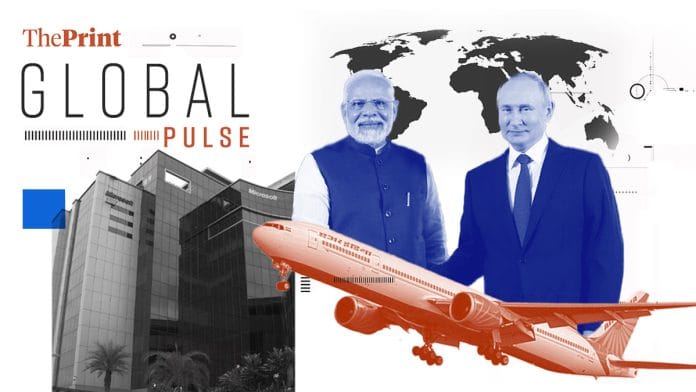New Delhi: Rather than exiting an “old cold-war friendship”, India seems to be deepening ties with the Western world’s biggest enemy: Russia.
In ‘India’s Faustian pact with Russia is strengthening,’ The Economist writes that India “sees its future with Russia in starkly different terms” than Western officials and observers, who hoped India could supplant the relationship with Russia with increasing reliance on America.
But the 2023 deal with America to jointly manufacture fight-jet engines in India wasn’t enough and the India-Russia relationship has stayed on course. In December, Defence Minister Rajnath Singh visited Moscow to discuss new deals and his trip was followed by a huge energy agreement. Russian President Vladimir Putin is now expected to visit India in early 2025, the article notes.
India has also been buying Russian oil despite sanctions imposed by the West—as discussed in an earlier edition of ThePrint’s Global Pulse. All this is part of India’s “multi-aligned” foreign policy—and Donald Trump’s return to the White House could also help ease pressure on Russia, which in turn will ease pressure on India.
“This bet could pay off. But the risks are severe,” says The Economist. “India (and China) could be forced to buy pricier oil from the Middle East.”
When it comes to defence, India is already less reliant on Russian arms, buying from France and Israel among others. However, it seems to always be interested in cutting new deals with Russia, says the article.
“All of which suggests that India continues to view Russia as its primary source of top-end weaponry, much of which America and its allies remain reluctant to share. And that Mr Modi sees Russia, alongside any willing Western partners, as a means to strengthen India’s defence industry,” says The Economist.
The Economist hasn’t forgotten the bad PR Modi got over his Moscow visit in 2023, when he “bear-hugged Mr Putin shortly after Russian missile strikes on Ukraine killed 44 people at sites including a children’s hospital”.
“For Indian officials the risks of strengthening ties with Russia appear to be acceptable. But they may be underestimating a longer-term problem. Russia could be a useful source of energy and technology in the short term. But its demographic and economic prospects are grim, even if peace returns,” says The Economist.
The article ‘Air India chief hails ‘climb’ phase in carrier’s ‘national mission’ of revival’ in the Financial Times takes a deep-dive into the ambitious turnaround of Air India, accurately describing it as the “former state-owned national carrier that Indians love to complain about”.
Under the airline’s five-year transformation plan, Air India’s chief executive—former Singapore Airlines veteran Campbell Wilson—has steered the plane through the “taxi” and “take-off” steps of the turnaround. Now, it’s in the “climb” phase of the plan, which involves scaling operations and driving profitability.
The airline is technically not out of the woods though—it reported a loss of around Rs 44 billion in March 2024, though this was lower than the Rs 114 billion it lost the previous year, John Reed writes for FT.
“This is a corporate turnaround story in sync with India’s triumphalist narrative under the Narendra Modi government of a rising nation proudly shedding its past of colonial oppression and economic underperformance,” Reed writes.
But for some, the change isn’t happening fast enough. It definitely doesn’t make it easier that Air India is often the butt of jokes.
“Air India still faces entrenched scepticism among Indians who abandoned it during its decades of decline. It also faces vigorous competition from the foreign carriers that fly to India and from IndiGo,” says the FT article. But it’s a mission that Wilson seems to be excited about executing.
“We do see this as a bit of a national mission, to make a new Air India,” he said. “If and when we get it right—and I’m quite convinced it’s when—there will be a huge level of support and engagement and customer loyalty that will come,” he told the FT.
Another FT story looks at how the Information Technology outsourcing sector is hoping for a second wind under Trump’s second presidency. IT and business process outsourcing is one of India’s most global-facing industries, the article explains, employing over 5 million people in a country that “has thus far been unable to provide large numbers of well-paid and formal job opportunities for its enormous labour force”.
In ‘Indian IT outsourcers look to Trump bump to revive fortunes,’ FT’s Chris Kay and Krishn Kaushik say this “renewed optimism” comes as US tech executives have been investing more in India in recent months. Microsoft’s Satya Nadella made a $3 billion investment last week, while Nvidia’s Jensen Huang announced a huge partnership in Mumbai in October.
All this is happening amid the H-1B debate raging in America, where Elon Musk has argued that there’s a “dire shortage” of IT engineers. However Indian outsources have “since significantly reduced their dependency on H1-B workers in the US where they have offices servicing clients locally”.
“More widely, economists and industry figures in India expect the world’s most populous nation, which has been edging closer into Washington’s orbit and whose leader, Narendra Modi, shares good relations with Trump, could be shielded from the worst of the US leader’s impulses,” FT reports.
Also Read: Religion, money & sheer numbers—Maha Kumbh gives global media the quintessential ‘India story‘







Why should the West designate Russia as the devil, with whom India should not do business. They were happy enough to cosy up to China when they felt it would help them defeat the Soviet Union. At each stage of deepening of friendship with the United States, it should have been made clear to them that this is a legacy we bring in our trousseau. 2. The outgoing Biden administration has imposed extensive sanctions across Russia’s oil export sector, aimed at India and China. Let us see how the Trump administration deals with this issue. In the first term, they had ended our oil imports from Iran.